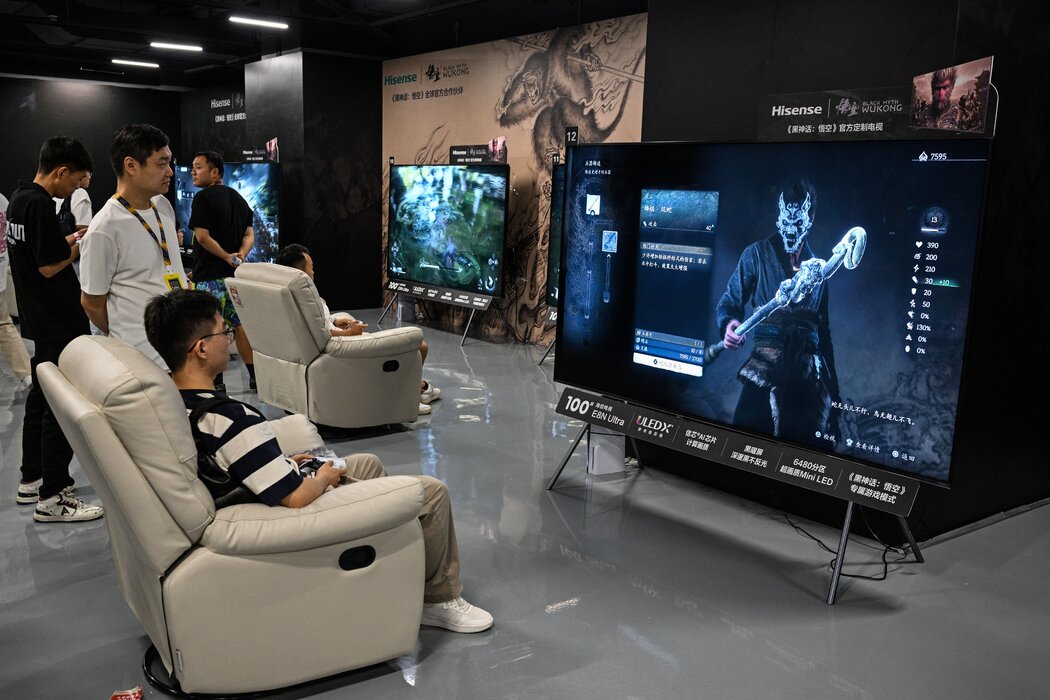《黑神話:悟空》是中國首款3A級遊戲,備受期待。然而,該遊戲的中國開發商卻要求遊戲直播者避免討論政治、女權主義、新冠疫情、中國遊戲行業政策等敏感話題。這一舉措引發了部分海外玩家的不滿,他們認為這是對言論自由的限制。遊戲的發布引發了中國民族自豪感,但同時也反映出中國政府對遊戲行業的嚴格管控。
Original Title: 《黑神話:悟空》爆火背後:言論管控令海外玩家不滿
Summary: “Black Myth: Wukong,” one of the most anticipated video games ever released in China, is a high-budget, cinematic-quality game that showcases China’s efforts to become a global cultural powerhouse. But before the game debuted on Tuesday, an affiliate of the game’s Chinese developer, Game Science, laid out a list of topics to avoid discussing during livestreams, prompting backlash from some influential overseas players. A document titled “Don’t Talk” listed forbidden topics — politics, “feminist propaganda,” Covid-19, Chinese video game industry policies and anything else “inciting negative remarks” — offering a glimpse into the restrictions content creators face in China and Beijing’s sensitivities. “In my 15 years in this job, I’ve never seen anything so shameful. This is clearly a document saying we have to self-censor,” said Benoit Reinier, a prominent French gaming streamer on YouTube, in a video. Game Science and Heroic Games, the company handling the game’s marketing, did not respond to requests for comment. The release of the game is a watershed moment for China’s gaming industry. It is seen as the country’s first “AAA” title, a high-budget global game with sophisticated gameplay and advanced visuals. It is one of the most expensive games ever developed in China, costing more than 400 million yuan, according to Chinese news media. Within hours of its release, the game had over 1.5 million players on Steam, making it the platform’s top-ranked game. “Black Myth: Wukong” is based on the 16th-century Chinese classic “Journey to the West.” The game’s protagonist, inspired by Sun Wukong, also known as the Monkey King, fights his opponents using a staff. Game Science also has backing from Tencent Holdings, one of China’s largest technology conglomerates and China’s largest video game publisher, which owns a 5 percent stake in Game Science. China’s gaming industry is primarily dominated by mobile games, not the high-budget console or PC titles that are released globally. “Black Myth: Wukong” was initially released on Sony’s PlayStation 5 and personal computers. China’s gaming industry has been in turmoil for the past few years. The government has tried to rein it in, concerned about children becoming addicted to games and corrupted by them. Beijing has imposed rules banning minors from playing online games on school days and limiting their gaming time on weekends and holidays. But the game’s debut sparked a surge of national pride, becoming a trending topic on Weibo, China’s Twitter-like microblogging site. One Chinese outlet pointed out on Weibo that the game’s default language was Chinese and said, “This feels so good.” Global interest in the game also highlights China’s efforts to promote “soft power.” The game is adapted from a novel considered one of the Four Great Classical Novels of Chinese literature. The game also depicts key cultural landmarks across China. “The success of ‘Black Myth: Wukong’ is not only a victory for the game industry, but also an important milestone for Chinese culture’s ‘going global,’” the official newspaper Yangcheng Evening News wrote in an article. The Shanxi provincial bureau of culture and tourism released a video highlighting Chinese landmarks in the north of the country that appear in the game. The game’s publisher, Zhejiang Publishing United Media, is a company majority owned by the Zhejiang provincial government, underscoring its close ties to the government. Mr. Reinier said that about three weeks ago, he received an email from Heroic Games asking if he was interested in receiving a free virtual “key” to play the game. (Heroic Games owns nearly 20 percent of Game Science and has financial ties to several state-owned companies.) Mr. Reinier said it was standard industry practice for streamers, and he was interested. When Heroic Games sent Mr. Reinier the key, it included a link to a document that “outlines some basic content creation guidelines.” By using the key to stream, “you confirm that you have read and understood the following guidelines,” the document said. Mr. Reinier said the document was unilateral and had no legal standing, but he opted not to stream the game. Among the topics that should “not” be discussed were Covid-19, “forced isolation” or “quarantine.” Beijing has been seeking to rewrite its handling of the pandemic. China’s “zero-Covid” policy helped to contain the virus for nearly three years, but it was ultimately abandoned after widespread dissent. After the government dropped the policy, Chinese censors have erased many mentions of hardship, like the lengthy forced quarantines of hundreds of millions of people. Another forbidden topic appears to be criticism of Game Science over accusations of sexism. The company has come under fire in media reports for what they say are lewd and sexist remarks made by its founder and for sexually suggestive recruitment materials from 2015. The original job posting and comments have been removed, and the company has not commented on the matter. As of Tuesday, a Chinese hashtag translated as “Black Myth Wukong is sexist” had been viewed 9 million times on Weibo.
Original article: https://cn.nytimes.com/china/20240821/chinese-videogame-wukong-censorship/zh-hant/?utm_source=RSS

